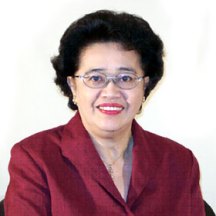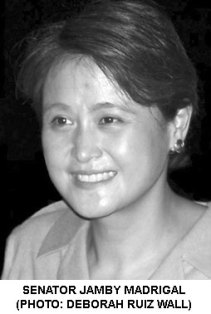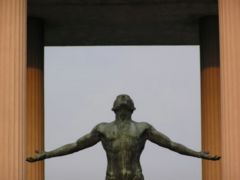CenPEG
ISSUE ANALYSIS No. 5
March 5, 2008
Series of 2008
The "critical mass" that can lead to the forced resignation of Gloria M. Arroyo can only rise from the spectrum of diverse groups and personalities agreeing who or what will replace the widely-discredited president.
Options and scenarios

The "critical mass" that can lead to the forced resignation of Gloria M. Arroyo can only rise from the spectrum of diverse groups and personalities agreeing who or what will replace the widely-discredited president.
Most of the 80,000 people who converged at the interfaith prayer-rally in Ayala, Makati City on February 29 supported the call for Arroyo's resignation or removal. The call was echoed by tens of thousands other rallyers who held similar protest actions during the same week in several cities throughout the country as well as in Hong Kong, the United States, Europe, and other countries.
The Arroyo regime is in red alert - in panic mode, if you will - since the February 29 rallies. The events showed the confluence of major advocacy groups, opinion leaders, and a big number of students in just two weeks following whistleblower Rodolfo "Jun" Lozada's corruption exposes' with their resounding call for the president's resignation.[1] It was like the thunderbolt that sent waves of masses taking to Edsa 1 and Edsa 2 – a political combustion that could electrify more mass actions increasing in frequency and in bigger numbers until the final day of reckoning for Gloria M. Arroyo.
Unprecedented
In many respects, the resign call is giving birth to a progressive plank even among the moderate groups as well as interfaith, lawyers, and youth sectors that see Arroyo's resignation or removal as a step toward a deep-going reform in government and in the state's political institutions. Outside the militant groups, this nuance was never seen before in Edsa 1 and Edsa 2. Seven years of the Arroyo regime have exposed alarmingly the fragility of the country's institutions on account of the subversion of the electoral system to prolong the president's rule, the manipulation of the legislature through bribery and tyranny of numbers to block impeachment moves, and military supremacy over the justice system particularly on so-called national security cases. What are claimed to be constitutional processes have succumbed to the use of force, threats, and corruption through bribery as a means of protecting the questionable rule of Arroyo.
Thus, the ground for starting a movement for democratic reform in governance by the people is already present.[2] Having said that, in the short-term, what should be the post-Arroyo replacement? This crucial question remains unresolved among the various and eclectic anti-Arroyo forces at this point. Almost everyone agrees however that some unity should be reached on this matter if the momentum for the resignation of Arroyo is to be sustained and pushed to its desired conclusion. There are various scenarios being floated:
1) Constitutional succession, with Vice President Noli de Castro assuming the presidency. This option is being pushed by the so-called "La Salle 60" which is composed of the Hyatt 10++ - the resigned members of the Arroyo cabinet – and other past cabinet members.
Except for its constitutionality, this option has drawn no serious appeal not only because De Castro is a lame duck but also because with Noli – an Arroyo protégé - at the helm it will not address the immediate demand to hold the beleaguered president accountable for the various charges of fraud, corruption, and killings thrown against her. Besides, whether De Castro can lead the initiative to reform the government system let alone its electoral process – an increasing demand from the parliament of the streets – also remains a question.
A variation to this option, which De Castro is expected to refuse, is for the provisional president to call for snap presidential elections even before 2010. The unanimous requisite for holding another election is the revamp of Comelec to ensure its independence and instituting effective mechanisms to safeguard the right to vote.
Revolutionary transition
2) A revolutionary transition government, which has been endorsed by groups aligned with a former university president and some military rebels. This can be the result of a successful ouster move against the seating president with the possibility that it will be backed by military elements. This option, which can result in a civilian-military junta, has no mass appeal as proven in recent opinion surveys, and does not sit well with both moderate and other militant forces in the anti-Arroyo regime struggle. It will face stiff resistance from Congress once the transition government moves to abolish it.
An extreme version of this option, which a few individuals seem to be entertaining, amounts to a virtual anarchy – anything to replace the regime "including chaos and revolution." What kind of "revolution" they mean is quite murky at this point.
3) A citizens' transition council to be headed by a Supreme Court justice. This imminent citizens-led council can also be the result of Arroyo's forced resignation. The emergence of this caretaker body is essentially a political act done under an extraordinary situation – reminiscent of the revolutionary transition in 1986 under Corazon Aquino – with enough powers while retaining the element of constitutional succession. The trailblazing transition council will be composed of – and staffed by - representatives of people's organizations, NGOs, and sectors that are struggling for the resignation or removal of Arroyo and are united by a concrete program of genuine social, economic, and political reform. These are the groups and sectors generally left out in Edsa 1 and Edsa 2 where the victories of people's struggles were hijacked by members of the elite and ruled the country in the old tyrannical and corrupt ways that people power had precisely struggled to demolish.
The citizens' transition council will address the public clamor for a non-traditional, pro-people political leadership that may likely draw support from other key players such as influential members of the interfaith, business, and the military. For this option to become feasible, however, the pressure that will force Arroyo to resign should be strong and insurmountable in a supreme act of sovereign power by the people allowing them - extra-constitutiona lly - to entrust powers to this caretaker body.
The short-term and minimum agenda of the proposed citizens' council is to initiate immediate reforms starting with the electoral system to ensure a clean and democratic election in 2010. So long as this is made clear – alongside with the fact that the council will exist only for a specific duration – then it will likely draw the support not only from the disparate political forces arrayed against the regime but also significant segments of the broad public. Elite and traditional politicians should admit that they have already lost their self-proclaimed right to dominate leadership while the people have begun to realize they should assert their sovereign power if comprehensive reform in governance is to be instituted.
Status quo
Still others – some presidentiables included - would rather see Arroyo finishing her term until June 2010 or roughly for about 800 more days. If this is ruled out, presidential aspirants would scream to high heavens on the day Noli de Castro is sworn into office in place of Arroyo because with government resources at his disposal that would ensure his election in 2010. Some political readers point out, however, that if Arroyo is allowed to stay in office until 2010, what will prevent her from hanging unto power beyond that?
As far as anti-Arroyo forces are concerned, either of these two scenarios would plunge the country deeper into a political turmoil. Better have a minor incision now than be forced to take a major surgery within the next two years.
The search for a political alternative is a communal work in progress. Its shape and configuration will evolve in the process of widening and increasing the momentum for replacing a widely-perceived corrupt and most despicable regime. But the answer for an alternative leadership must soon be cobbled together by all democratic and patriotic forces as it will serve as the bridge toward building the "critical mass" needed to put an end to a regime of greed and fear. The arduous and contentious process of political reconstruction should begin with the first step.
____________ _________ _________ _________ _________ _______
[1] See CenPEG Issue Analysis No. 04, "People Power," February 26, 2008 at www.cenpeg.org
[2] This should be distinguished from the dynamics of the Marxist-led people's democratic revolution which seeks the restructuring of the society with a socialist perspective, and with the foundations of a revolutionary government already underway in the rural countryside. Other ideological groups envisage peaceful reform using the parliamentary mode while others are pushing for urban insurrections.
Reference:
Bobby Tuazon
Director, Policy Study, Publication and Advocacy (PSPA)
Center for People Empowerment in Governance (CenPEG)
TelFax +63-2 9299526; mobile phone: 0915-6418055
E-mail: cenpeg.info@ gmail.com; info@cenpeg. org
http://www.cenpeg. org







